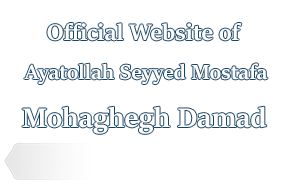- Osoulol Fiqh
- Analytical Jurisprudence
- Analytical jurisprudence rules
- Quranic Sciences and Interpretation
- Islamic Theology
- Tarajem & Rejal
- Philosophy
- Philosophy of Law and Jurisprudence
- Analytical Civil Law
- Islamic Criminal Law
- Islamic Human Law
- Environmental law
- Public Law
- Family Law
- International Law
Ayatollah Seyed Mostafa Mohaghegh Damad
Analytical Civil Law,Article,Works
30 June 2016
Ayatollah Seyed Mostafa Mohaghegh Damad
Head, Islamic Studies Department, Academy of Sciences
Co-President, Religions for Peace
Ayatollah Mostafa Mohaghegh Damad of Iran is as much known for his academic and political presence in the religious world as he is his advocacy positions. A scholar and educator at universities in Iran, Damad has also been known to engage with other faith leaders in initiatives advocating for human rights in interreligious disputes, as well as using his knowledge of religious practice of multiple religious perspectives to provide insight into current political events.
Ayatollah Damad underwent education in both modern and traditional Shi’a Muslim spheres. By 1970, he was deemed educated enough to be named Ayatollah, and he received his B.A. in Islamic Philosophy and his M.A. in Islamic Jurisprudence from Tehran University in 1969 and 1980 respectively. As such, his discussion of current events usually stems from a philosophical and legal point of view. As such, he has spoken out against the unduly harsh sentencing of political protesters, for which he has gained notoriety in both Iran and globally. His focus on the proper nature of justice has led him to become involved, through speech and writing, in peace organizations outside of RfP. He has spoken about the necessity to observe Islamic law in accordance with the Universal Declaration of Human Rights, stating that the two are compatible. Additionally, he is a signer of the “A Common Word between Us and You” endeavor, which saw to unite Christian and Muslim leaders for the purpose of interfaith cooperation. Ayatollah Damad’s vast knowledge of his own faith, and his focus on employing just interaction to other faiths speaks to a compassion fitting with the ideals of Religions for Peace.





